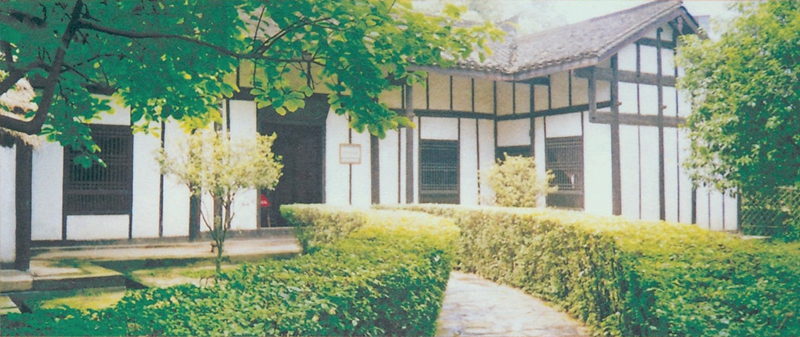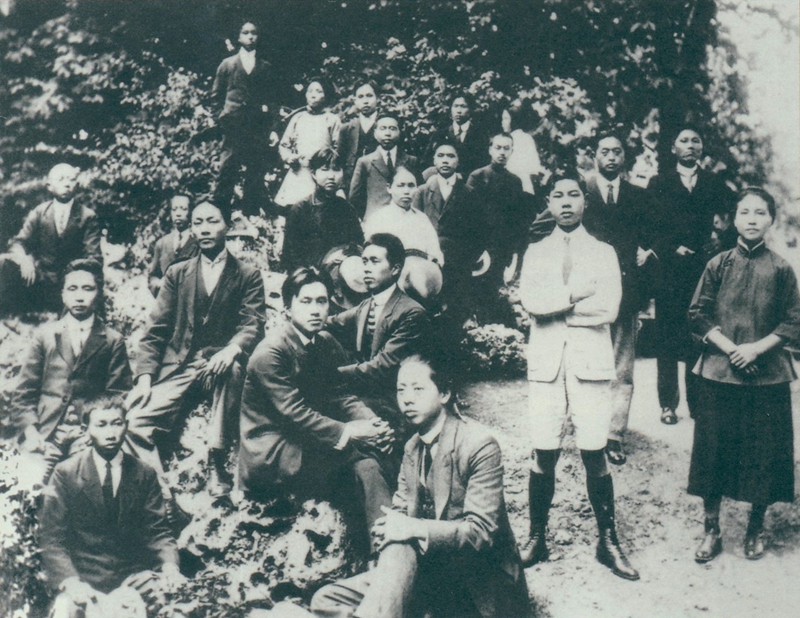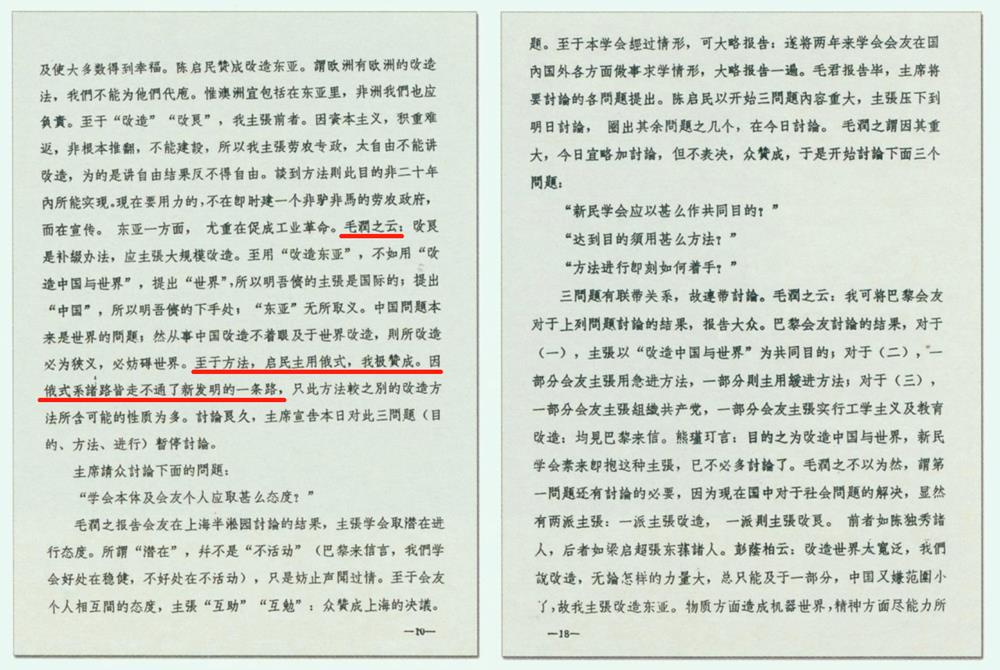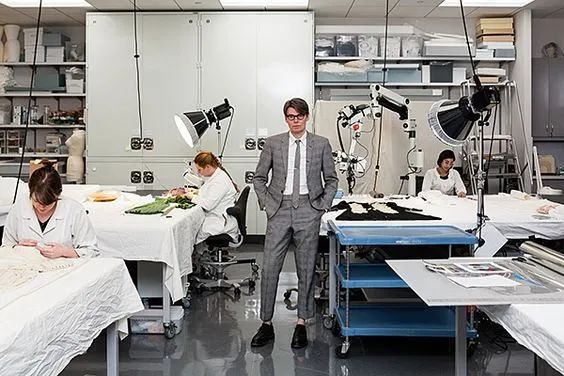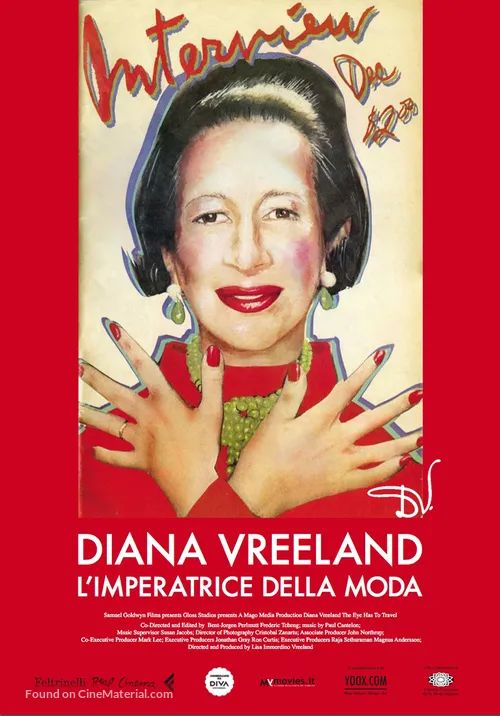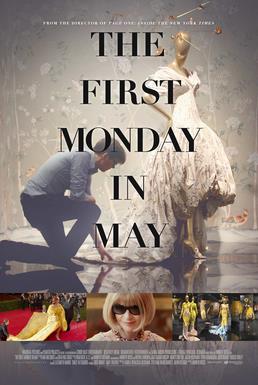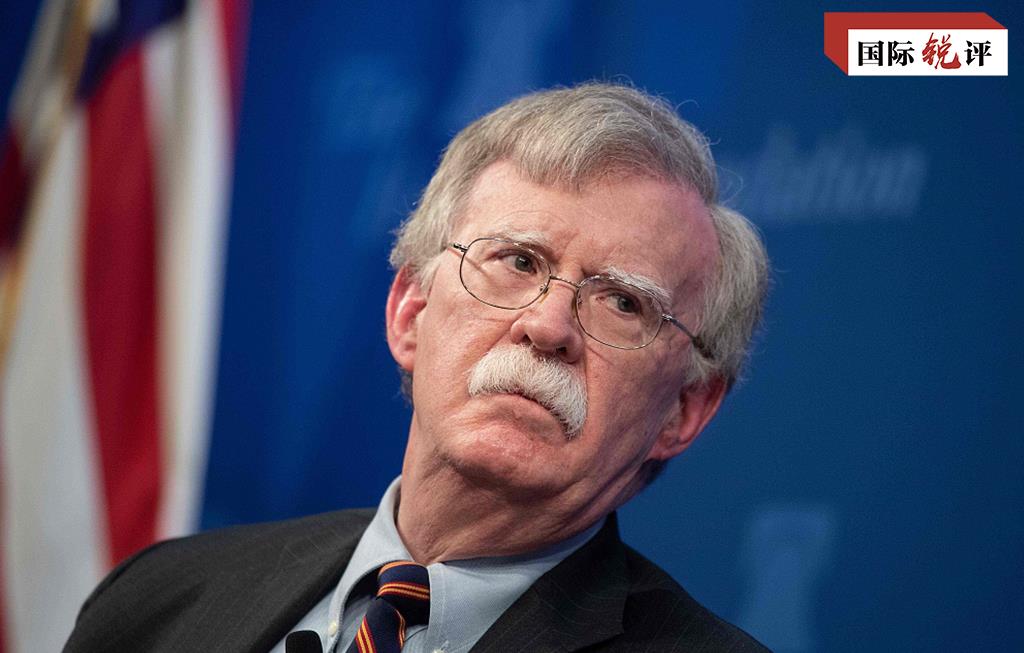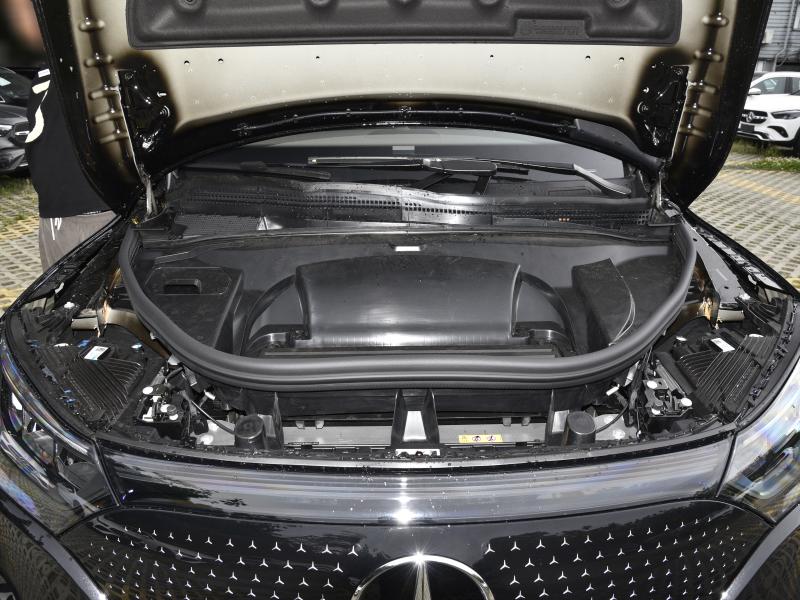The annual Chinese Valentine’s Day is coming again. When it comes to Tanabata, many historical legends related to love and romance will come to mind. Cowherd and Weaver Girl, Xu Xian and White Snake, their stories are unforgettable. Do you know that in Chongqing, there have been many legends related to love since ancient times, and their romance and twists and turns are no less than the cowherd and the weaver girl. It can be said that Chongqing has been a romantic city since ancient times!
Wushan sex is a few words of love.
The king of Xiang is interested in the goddess, but not intentional.

△ goddess peak
At the end of the Warring States Period, King Xiang of Chu and Song Yu, his minion, were hunting and playing in Wushan. As far as he could see, King Xiang felt that there were clouds and mountains around goddess peak, which lasted for nine days, but before he could look closely, the clouds changed again, and various wonders emerged one after another.
King Xiang of Chu was very surprised at the scene before him and asked Song Yu why. Song Yu replied, "The mist changes to hide the residence of the goddess Chaoyun. Many years ago, your father Chu Huaiwang cruised here-he was very tired at that time, so he took a nap. In the dream, King Huai met a goddess who claimed to be the daughter of Wushan. She was willing to share her pillow and mat with King Huai. When leaving, the goddess said-‘My concubine is in the sun of Wushan, and the resistance of high hills. When it’s morning clouds, it’s raining at dusk, and it’s under the balcony. " Chu Huaiwang woke up and went out to watch, and the scene was as the witch mountain goddess said-the clouds in goddess peak were layered and rose like tall and straight pine trees. The clouds suddenly change, like a beautiful woman. The mist is mixed with gentle rain drops, which come and go without a trace and are unpredictable. King Huai watched for a long time, and he became more and more attached to the goddess of Wushan, so he built the goddess temple here and named it Chaoyun. The allusion to’ Wushan Yunyu’ came from this. "
After listening to it, King Xiang of Chu couldn’t help but yearn for the goddess of Wushan, and he left a poem here, "The king is interested, but the goddess is unintentional." Later, Ma Zhiyuan, a great master of the Yuan Dynasty, re-described this magical story in "Four Jade Wushan Temple": "The evening rain greeted and sent it to the clouds, and the evening rain disappeared without a trace. Xiang Wangman said that the balcony dream, the clouds are also empty, and the rain is also empty. How can we get the twelve peaks? "
There is also a legend that the Wushan Goddess is actually the incarnation of Yao Ji, the daughter of the Queen Mother of the West. According to the "Wushan County Records", "Yao Ji, a Chi Di woman, died without a line and was buried in the sun of Wushan as a goddess." The goddess once came down to help Dayu control the water. After the flood was eliminated, she still decided to stay in Wushan, pointing out the navigation channel for sailing and expelling tigers and leopards for the people. After a long time, she turned into a mountain peak for later goddess peak. The accompanying maid and Yao Ji also turned into other peaks in the Twelve Peaks of Wushan.
The rich man’s daughter falls in love with the cowherd
Do not hesitate to embrace and jump off a cliff for love.

△ Shisunshan
According to legend, Yongchuan is now in Yunwuping. In ancient times, the local rich man had a daughter who was regarded as the apple of his eye. She was eighteen years old, and her appearance was heavy and she was ashamed of flowers. She goes to Huanxiping to play every day. As luck would have it, one day, the young cowherd hired by the rich man’s family was there. They fell in love at first sight, and decided for life. Since then, every day, teenagers have taken the opportunity of herding cattle or firewood to have a tryst with Miss Huanxiping and look forward to a bright future. I didn’t know that the rich man soon learned about it and became angry from embarrassment, so that the family sent the boy away as soon as possible.
After learning this situation, the young lady escaped from the house with the teenager that night. In a short time, a dozen assume holding torches like a fire dragon. The two helped each other and ran hard on the mountain road until they reached the edge of the cliff. On the verge of being chased by the servants, the two men covered in blood embraced and jumped off the cliff.
At the critical moment, a miracle appeared. A colorful cloud brought them back to their original place, and Guanyin Bodhisattva appeared in front of them, blowing a mist in front of the chasing servants, covering up all the mountain roads, so that the servants with torches could not find their way completely.
Bodhisattva looked at the boy, pointed his finger to the north, and turned into a mountain peak shaped like a boy, which was called a male stalagmite. Then he looked at the young lady, pointed his finger to the south, and turned into a mountain shaped like a young lady, which was called the female stalagmite. The Bodhisattva arranged these things and took them to heaven and left.
It’s Chang ‘e’s earthly love.
Or the villagers’ resistance to bullies?

△ Wanshou Mountain male and female stone pillars
On Wanshou Mountain in the east of Shizhu County, there are a pair of huge stones that look like boys and girls. The locals call them "male and female stone pillars", hence the name Shizhu County.
Legend has it that Fairy Chang ‘e felt very lonely in the Guanghan Palace, so she came to visit Wanshou Mountain. Unexpectedly, she met a tiger, and the Tujia youth Lan Zhuzi gave her life to save her. Later, they got along with each other day and night, and gradually developed feelings, which attracted the jealousy of a mountain fairy, Lohan the Bigfoot. He tipped off the Jade Emperor, and then tricked them into a spell to separate them with a cottage and turned them into stone pillars.
In addition, another legend related to these two stone pillars is circulating in the local area.
According to legend, a long time ago, there lived a young man named Zhuzi on the mountain. He was intelligent, friendly, hardworking and brave. He made a living by hunting and firewood. He often went to the county seat below the mountain to sell prey or firewood in exchange for oil, salt, sauce and vinegar, and his life was quite comfortable. At the foot of the mountain, there is a farmer named Fu and a girl named Xiaohua. The family is guarding half an acre of land and living a tight life. Because the Fu family is honest, they never get involved with others. Even Huang Ba, the rich man in the village, really can’t find a reason to occupy the Fu family’s half-acre field.
One year younger than two years old, Fu Xiaohua will be 16 years old at first sight, and she has fallen into a girl of water. Small flowers often go to Wanshou Mountain to cut wood or dig wild vegetables, so they often meet with pillars unexpectedly. Zhuzi is warm-hearted, and often helps Xiaohua to cut wood and send her down the mountain. Over time, the two have a mutual affection, secretly set a lifelong meeting on Wanshou Mountain every day, help each other with their work, and plan to marry Xiaohua when Zhuzi builds a decent house.
One evening, the pillar sent Xiaohua down the hill, put down the firewood and let Xiaohua carry it home. Unexpectedly, Xiaohua met the rich man Huang Ba halfway. Huang Ba, who is over 50 years old, wears a melon hat and a green mandarin jacket and walks like a pregnant woman. When he saw the delicate and pretty little flower, his eyes suddenly brightened, he stared at the face of the little flower, twisted his head backwards and asked the two servants behind him, "Whose family is this girl as beautiful as flowers and jade?" Who quickly replied: "It’s Tian Wan’s family, and they are all sixteen years old." Huang Ba immediately grinned and came to meet Xiaohua. Xiaohua blushed and panicked at the foot of her heartbeat. She quickly turned and walked towards another ridge. Xiaohua trotted home with heavy firewood. She knew that the rich man Huang was definitely not kind.
The next day, Xiaohua was preparing for the entrance to the mountain. The village matchmaker came and blocked Xiaohua in the house, saying that Master Huang had a crush on Xiaohua and would marry Xiaohua to be his third aunt in five days. Xiaohua suddenly turned blue with anger and threw out a gift to drive away the matchmaker. Xiaohua thought that he had to consult with the pillar quickly, and Yu Zu Xiaohua went to Wanshou Mountain again. Unexpectedly, Xiaohua had been followed by the yellow rich man’s servants, and what they said was eavesdropped. When the rich man of Huang learned of the tryst between the pillar and the floret, he was so jealous that he was born with evil intentions. He immediately found the housekeeper Huang Er and muttered mysteriously for a while.
On the morning of the third day, I saw Huang Er, the housekeeper, with ten servants, three shotguns, three wood knives and a rope, leaving angrily for Wanshou Mountain. When Xiaohua found out, she knew that something was wrong and ran to the mountain. Xiaohua is worried about the pillar, and she thinks that her dear brother pillar will be harmed by the rich man. Her heart is like a knife, and she would rather die. Xiaohua ran and ran, and when she was near the top of the mountain, she caught up with the family. Xiaohua could neither shout loudly nor overtake them, because there was only one narrow path on this cliff.
Xiaohua was anxious, angry, afraid and tired. In a hurry, she plopped down on a rock and begged Grandpa Mountain God to help her: "As long as I can stop the enemy from going up the mountain and protect Brother Zhuzi, I will become a river, a boulder and a tiger." Xiaohua kowtowed again and again, tearfully, and finally moved the mountain god. Suddenly, I saw the little flower flying, and there was a loud noise. A huge stone landed firmly in front of Ding Ding, blocking Ding Ding’s way up the mountain. All Ding Ding was shocked by the scene before him. A closer look shows that the boulder in front of us is like a statue, with full breasts, high breasts, soft lines and delicate posture, resembling an affectionate and stubborn girl, and the Ding family is scared out of their wits.
When Huang Ba learned this, he rushed to the mountain to see the Party, and confirmed that Xiaohua turned into a stone pillar to block the mountain road. He was flustered. He thought that as long as the pillar was killed, Xiaohua would obediently follow him. Now that the beauty can’t be obtained, the more he hates the pillar, he ordered the servant to open a road up the mountain from the stone pillar. How could Xiaohua let him succeed? He moved the left nipple on his chest and smashed it down. Huang Ba and the old housekeeper died on the spot, and other servants fled.
Said pillar in the mountain mood fidgety, fidgeting, always thinking about flowers in my heart, suddenly heard the roar of the mountain, and someone crying dad called niang, he quickly ran down the mountain, when he saw the boulder on the road like his flowers, and then look at the body of Huang Ba on the ground, he understood what was going on, holding the pillar and crying for three days and three nights. Zhu Zi thinks that without Xiaohua in life, he has no hope, and cattle life is meaningless. He can’t let Xiaohua suffer from wind and rain and loneliness in the mountains. The pillar "plopped" and knelt beside the pillar, begging the mountain god to help him, so that he could become a pillar and stay with the floret. He would look after the floret every day and protect it. The mountain god was moved by their loyal love and decided to fulfill them. So the pillar turned into a boulder and stood opposite to the floret, and the inseparable couple could finally be together every day.
The Godfather Bazu and the Goddess of Salt Water
A sad and tragic love legend

"Before Lin Jun, the witch was born." According to the Biography of Nanman Southwest Yi in the Later Han Dynasty, "Nanjun Man in Ba County originally had five surnames: Ba Shi, Fan Shi, Riqin, Xiang Shi and Zheng Shi. It’s all because of the sudden death of the clock and the departure from the mountain. "
According to ancient documents, the earliest monarch of Pakistan was Jia Jun. According to legend, a stone pit, red as cinnabar and black as lacquer, was created when the bell that fell from the mountain collapsed. A man came out of the red pit, named Wu Xiang and surnamed Ba. Someone came out of the black pit with four surnames: Xu, Fan Shi, Bai and Zheng. After the appearance of the five surnames, they began to fight, so Wu Xiang pierced the pit wall with a spear, saying that anyone who could pierce the spear on the pit wall would be a Linjun. "Lin" refers to the tiger in ancient times, and "Lin Jun" means "Tiger Jun", which means fierce and brave, that is, the leader of the Ba people with the white tiger as the totem. As a result, no one named Wei, Fan, Bai and Zheng tied up, but Wu Xiang could still hang his sword on the spear tied on the pit wall. He also made a boat out of soil, carved and painted on the hull, and then let the boat float on the water. The agreement said, "If anyone’s boat can float on the water, he can be a monarch." A ship with a unique business phase can float on the water, so it is called Linjun. Wu multiplied his earthen boat, took all his people with him, went down the Yishui River, and arrived at Yanyang.
The development and growth of Ba people is not unrelated to its rich salt resources. According to the book, after Lin Jun came to power, he began to lead the Ba people to migrate everywhere. On the way, he met the goddess of salt water. Salt god fell in love with Lin Jun at first sight and was willing to give his salt mine resources as a dowry to Lin Jun. Unexpectedly, it was rejected by Lin Jun. In order to prevent Lin Jun from continuing to migrate, Salt god turned into a thousand eagles to block his way. In order to lead the tribe to move on, Lin Jun gave Salt god a red silk scarf as a token of love for a pretence. Unexpectedly, when Salt god once again turned into a thousand eagles to block the Ba people’s way, Lin Jun took out a bow and arrow he had already prepared and aimed it at the eagle wearing a red silk scarf. The migration story of Ba people has since evolved into a sad and tragic love legend.
Dayu went through the house three times and didn’t enter.
Tu Shanshi looked through the autumn waters and looked forward to her husband’s return

△ Huguishi
Outside Chaotianmen, in the Yangtze River at the foot of Tu Shan on the south bank, there is a huge Hugui stone.
According to legend, there was a big flood in ancient times. At that time, the sky was connected with water, and the water was connected with the sky, and there was a piece of Wang Yang. The crops were flooded and the houses collapsed. The people hiding at the top of the mountain cried for help day and night, pleading with the Emperor of Heaven, praying to repel the flood and save them from death. People finally touched a god named Gun. After he got the "fallow land" collected by the Emperor of Heaven, with the help of the ostrich and the tortoise, he drove back the flood and saved the people.
When God knew this, he was angry and ordered Zhu Rong, the courtier, to kill Gun. Take back the "fallow land" and the earth will be flooded again. Gun was killed by the cruel Emperor, but his heart of loving people and upholding justice did not cool down, and finally he became his son-Dayu. Dayu came down from the sky to Jiangzhou (now Chongqing). I met a lonely slave girl in Kyubi no Youko, Tu Shan, and they hit it off and got married.
This day, the fourth day after Dayu got married, he came to Phoenix Mountain to check the water situation. The water god makes waves, and the turbid waves of the Yangtze River beat the sky. I saw a white-haired old man, holding a girl, trudging along. The girl pointed to a peach tree and shouted, "Grandpa, I’m hungry. Pick me some peaches quickly!" " The old man staggered forward and just climbed the peach tree. A vicious wave came and washed away the old man and the young man … Seeing this scene, Dayu was full of thoughts and thought: How many families will be swallowed up by the flood if this continues! So I decided to introduce the flood of the world into the sea. Worried, he quickly turned around and went home, and confided his ideal to the Tu Shan girl: "Mountain girl, I’m going to dredge the Jiuhe River far away. Will you let me go?"
Tu Shan was reluctant to go, but she sent Dayu down the mountain. From Lianhua Mountain to the present Juelin Temple and Xuantan Temple, it has been sent to the riverside beach. I saw Dayu transformed into a rhinoceros, with a unicorn on his head, sharp as a sword. Then go down the river, poke the stone base mountain and shovel the mud into the soil. After Dayu left, Tu Shan women stood under the stone slope every day, looking at the direction of Dayu’s departure, crying …
Time flies, and it is three years since Dayu took control of the water. It was dusk, and Dayu returned to the foot of Tu Shan. Looking at his home, he saw a light coming out of the cave. Ah, the mountain girl is still waiting for me! He was stepping ashore when he heard the loud noise of the river beating against the rocks. Looking back, where the upstream is dredged, the flowing water is happy; But the flood downstream still covers the sky. Dayu felt a quiver in his heart: How can I go home before the river is fully dredged? So he turned into a rhinoceros and jumped into the rolling flood.
As soon as Dayu left, the Tu Shan girl realized that it was strange: How did the roaring river become so calm? She flew out of the hole and stood on the hillside looking out, only to see a rhinoceros poking stones downstream. She understood: this is her husband! Tu Shan stood on the stone by the river and shouted affectionately, "Yu! Come back soon! "
Three years later, Dayu completely leveled the flood in the Yangtze River. He also arrived in Shaoxing, Zhejiang Province. Then, with joy, I returned to Tu Shan’s feet for the second time, only to see the lights still on in the cave and hear the songs of missing. Dayu couldn’t help speeding up his pace. However, when he approached his door, a gust of mountain wind blew and said to Dayu, "Dayu, do you know?" Your water control has spread to heaven, and the Emperor of Heaven ordered the mountain monster to move to a Wushan Mountain, which blocked the Yangtze River again. Go and dredge it quickly! " Dayu was full of anger at this time: "Damn God! You can bring Qian Shan Wanling here, but you can’t stop me from dredging the river. " He turned around and left without hesitation.
Tu Shan female heard familiar footsteps outside the cave and hurried out to visit. Why? The footsteps turned into a loud noise from the mountains to the rocks. Tu Shan woman ran to the place where she called Dayu before. Strange to say, the rocks on that slope are higher than before. It turned out that the deep feeling of Tu Shan women missing Dayu moved the Dragon King, and the Dragon King sent the tortoise to squat there, so that Tu Shan women could climb high and look far.
The day after that, when Tu Shan was resting in the field, as usual, she stood on the slope, set up an arbor with her hands, stared at the river and missed her loved ones: Yu, the Yangtze River has been unblocked, and you should have come back long ago. Suddenly I saw a man coming from afar. Tall, broad shoulders, thin face, two thick black knife-shaped eyebrows, flashing a pair of wise eyes. Ah! This is none other than her Dayu! Tu Shan woman was overjoyed to see her husband return. She took Dayu and said, "I finally waited for you. Go home quickly!" " "No, there are still the Luohe, Fenhe, Weihe and Huaihe rivers that have not been dredged, and people are still suffering!" "Look, the rocks have worn out thick calluses on your hands. You are too tired." "Isn’t my body strong?" "Your clothes are torn and should be mended; Your sandals are rotten, so it’s time to change a pair. " "Alas, time is precious!" Dayu stroked Tu Shan’s shoulder, and then said, "The world is full of floods, and I will never go home."
Dayu comforted his wife and left without looking back.
Tu Shan women chased Dayu and gradually lost sight of him. Standing by the river, she saw a rhinoceros breaking the waves flashing in the middle of the river. Tu Shan woman shouted loudly: "Yu, I will stand here and wait for you all my life!" "
Really, Tu Shan women waited and waited for 999 days, shouting: "Yu, come back!" " Over time, Tu Shan turned into a stone. There are still stains on the stone, like the long hair of a mountain girl, floating in the river, and the waves wash her body. The rushing river cried out for Tu Shan women day and night: "Yu-come back!"
Rhododendron in Jinfo Mountain wept blood and brought flowers all over the mountain.
A long time ago, a young man in Jinfo Mountain was kicked out of his house by his cruel brother and sister-in-law. He met a foreign woman and got married. The woman’s name is Du Fu. Du Fu told her husband that there is a Penglai Fairy Island in her hometown. There are evergreen trees on the island, which are flowers that never fade all the year round. Young people collect rare flowers and plants all over the slope and dam. This story reached the ears of brothers and sisters-in-law, who were jealous. Brother and sister-in-law set a fire and threw the cuckoo into the fire, but the cuckoo turned into a Hong Niao and flew out of the fire. From then on, I went out early and came back late, and I brought all kinds of fairy flowers, and the blood on my mouth dyed the fairy flowers a little deep red. Finally, Hong Niao was so exhausted that the young man cried his eyes out, buried his "beloved wife" in Jinshan, and named those fairy flowers Rhododendron, and Rhododendron took root in Jinfo Mountain. Nowadays, whenever the cuckoo is fragrant, people will always see a cuckoo hovering over it, singing very sweetly.
Fishing lang sells fish to help lovers bury their mothers.
When encountering difficulties, the Eight Immortals cast spells and rescue skillfully.

△ Huixian Bridge
In ancient times, there were not many people in Chongqing, and Daliangzi (now Xinhua Road) was still a forest. From Daliangzi, a stream flows down, which is about Zhengyang Street, passes through Dayanggou, reaches Hongyadong and flows into Jialing River. Huixian Bridge is a bridge on this stream, which may be less than 10 meters long. It is called Huixian Bridge because it is said that someone met a fairy here.
There lived a girl under Hongyadong, who often went to the Jialing River to wash clothes. Once, her washing was washed away by the river. A single fisherman by the river saw it and rowed a fishing boat to pick it up for her. Therefore, the two have mutual affection.
One day, the girl’s mother died of illness. The girl had no money for burial and was anxious to jump into the river. The fisherman rescued her and said to her, "I found a golden carp on the net, and I immediately picked it and sold it. After selling it, I went to buy a shroud and coffin." Who knows, he carried fish into the city, just walked to the bridge, and all the lively golden carp died hard, so what money can he sell? I was so anxious that the fisherman jumped up and cried on that bridge At this time, he heard a voice from the earth temple: "Make way quickly, the eight-hole fairy is coming!" " He looked up, but there were eight beggars, but he knelt down and asked the gods for help. The leader is a lame old man with an iron crutch, saying, "We are all beggars, and we haven’t eaten ourselves. How can we help you?" The beggar with a sword picked up a stone and threw it into the fish basket of the fisherman, saying, "All your fish are alive, so why not sell them quickly?" At first glance, the fisherman looks hard. Throw the stone into another basket and the fish will live. Looking again, the beggars were all gone. So the fisherman sold it for a good price, buried the girl’s mother, and then married the girl and settled down at this bridge. This bridge is also named Huixian Bridge.
The Dragon King met the fairy in Tsing Yi.
Be punished for not being together across the river.

△ baimashan
According to legend, Aoguang, the dragon king of the East China Sea, took Aochifeng, a tall and handsome prince charming, to heaven and met Zhang Tianyang, a graceful Tsing Yi fairy. They fell in love at first sight, secretly came to the mortal world and played in Baihua Valley, but were discovered by the Queen Mother and knocked down by her ruler. Aochifeng and Zhang Tianyang were separated on both sides of the Wujiang River, and they could never get together. Aochifeng could only look at the opposite Zhang Tianyang in Wangxian Cliff every day, and they changed into two mountains, one for fairy mountain and the other for baimashan.
Nowadays, fairy mountain and baimashan, because of a love legend, have become "lovers’ mountains", and gradually become known, attracting tourists to baimashan to express their love and lovesickness in scenic spots such as Wangxianya, Shouxiantai and Sissendai.
What other love legends do you know about Chongqing? Let’s talk about them.
Upstream news synthesis
[Disclaimer] The texts, pictures, audio and video that are not marked with "Source: Upstream News-chongqing morning post" or "Upstream News LOGO" on the upstream news client are all reposted. If the reposted manuscript involves copyright issues, please contact the upstream news.
